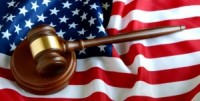4. Fight for Legalized Sports Gambling in New Jersey, and the Proliferation of Daily Fantasy Sports Across the Globe. With the proliferation of online gaming throughout cyberspace, it seems inevitable that America is headed in the direction of legalized …
Category Archives: In The Law
Court Stops New Jersey's Effort to Legalize Sports Betting
Your article was successfully shared with the contacts you provided. A New Jersey federal judge last month rejected New Jersey’s latest attempt to legalize sports betting, ruling that a state statute that repealed New Jersey’s long-standing prohibition on …
Denver illegal gambling boss gets 15 months in federal prison
A man who ran a multimillion-dollar sports gambling ring in Denver has been sentenced to 15 months in a federal prison. U.S. District Judge Raymond Moore also sentenced Kerwin Sande on Monday to three years of supervised release for convictions of illegal …
Kerwin Sande, of Play First Sports, gets prison time for running illegal gambling ring
Dense Fog Advisory issued January 7 at 5:26AM MST expiring January 7 at 9:00AM MST in effect for: Custer, El Paso, Fremont, Huerfano, Las Animas, Pueblo, Teller Dense Fog Advisory issued January 7 at 5:16AM MST expiring January 7 at 9:00AM MST in effect …

Why Are Credit Card Companies No Longer Afraid Of U.S. Gambling Laws?
When the Unlawful Internet Gambling Enforcement Act (“UIGEA”) was signed into law in October 2006, legal experts predicted the act would scare away credit card companies from funding businesses that could arguably be construed as illegal sports gambling.
The prevailing theory, at the time, was that even if U.S. laws could not deter entrepreneurs from entering into risky online gaming markets, U.S. laws could certainly deter prudent and stodgy credit card companies such as Visa and MasterCard from funding these gaming ventures.
At first, the UIGEA seemed to work. But over time, the UIGEA’s impact has been far more limited than what Congress may have expected.
Today, few, if any, payment processing companies seem to be truly afraid of the UIGEA. Only eBay , which operates the payment processing company PayPal, takes the threat of government action at all seriously.

Phua Illegal Gambling Trial Put on Hold
BIG:T;he trial date for the father-son duo of high stakes poker player Wei Seng “Paul” Phua and Darren Wai Kit Phua has been postponed while a judge decides whether the constitutional rights of the pair were violated.
The elder Phua, 50, and 23-year-old Darren, were preparing for a January 12 trial date, but that date has been vacated without a new date set. The Phuas were charged with taking bets illegally during FIFA World Cup competition in July while staying at the Caesars Palace hotel in Las Vegas.
The case hinges on possible 4th amendment violations on the part of the FBI, who purposely cut off Internet access in the hotel in order to pose as repairmen and gather evidence in Phuas’ hotel rooms needed to obtain a search warrant. Those tactics certainly sound a bit shady, even to those of us who don’t possess a degree in law.
Law enforcement authorities contend that Paul Phua is tied to the 14K Triad, a Hong Kong-based crime syndicate that allegedly obtains a good percentage of its funds from illicit gambling endeavors. The attorneys for the Phuas have vehemently defended the pair on the gambling charges, pointing to the search strategy used by the feds as highly suspect.

New Jersey Law Would Require All Online Gambling Software Providers to Have a Casino License

New Jersey Assemblyman and noted anti-online poker advocate Ralph R. Caputo is currently sponsoring a bill (Bill) that would make it illegal for any “Internet gaming affiliate” (Affiliate) to operate in the state without first obtaining a casino license.
It also stipulates that this licensing requirement could not be waved under any circumstances.
If passed, the Bill will remove the streamlined approach currently undertaken within the New Jersey Division of Gaming Enforcement (NJDGE) itself and instead subject Affiliates to the additional scrutiny of the NJ Casino Control Act (Act) and by extension the New Jersey Casino Control Commission (Commission).
The vote to pass the Bill out of the Tourism, Gaming and the Arts Committee was unanimous and it could now go to the full chamber for a vote.
Why Have One Sentence of Regulation When You Can Have Ten Pages Of It?
Currently, affiliates are required to obtain a “Casino Service Industry License” through the NJDGE. Affiliates seeking to partner with land-based casinos must meet the following NJDGE standard to be granted a license:
Q:Personnel/qualifiers must demonstrate good character, honesty, and integrity as well as financial stability, integrity and responsibility. Qualifiers must not have engaged in any conduct that is prohibited by Section 86 of the Casino Control Act.”;
This is a much less onerous burden of proof than the ten pages of regulations which the Commission has for granting a casino license – most of which merely serve as an outline/guide to the myriad of forms and declarations required of applicants.
Additionally, the Bill would add layers of regulatory oversight by keeping the NJDGE in its current role as an investigatory body for applications, while removing its ability to make a final decision on them by transferring that authority into the hands of the Commission itself.
Third Party Software Essential to the Industry
The potential for regulation to be ratcheted up is definitely a cause for concern amongst Affiliates. However, they are not the only ones who will be sweating the Bill as it moves through the legislative process.
Land-based casinos generally have zero background in running online gaming and therefore currently rely on partnerships with experienced Affiliates to successfully enter the market. This Bill threatens to severely complicate (if not entirely destroy) this model, raising the specter of a severing of the link between name-brand properties and Internet customers.
Given that revenues from online gaming have been far below projections, it is unlikely that a casino such as the Borgata will make the investment necessary to remain open if it can no longer easily partner with an experienced Affiliate such as PartyPoker. The much likelier scenario is that it will simply exit the market altogether, forgoing the revenue generated under the current system.
Therefore, the Bill could seriously undermine – if not destroy – the fledgling NJ online poker and gambling industry. That’s why serious opposition to it can be expected from land-based casino interests in the state.
In Case You Didn’t Know There Is This Company Called PokerStars
It seems as though no discussion about the regulation of online poker in the US is complete without at least a tangential reference to the possible return of PokerStars to the market.
Caputo is known to be anti-online gaming generally, but is especially vocal in his condemnation of PokerStars due to the indictments facing former owner Isai Scheinberg.
It is therefore likely that his sponsorship of this Bill is primarily aimed at ensuring PokerStars does not have a backdoor into the NJ market that would allow the company’s previous run-ins with the US Department of Justice (DOJ) to be downplayed or forgotten.
Interesting to note on this point is that by requiring Affiliates to apply for a casino license, the Bill would also subject them to a provision of the Act which says the Commission may consider “undue economic concentration in Atlantic City casino operations.”
Given the fact that four Atlantic City casinos have already shuttered their doors this year alone, this provision could theoretically be used as a “fail-safe” to ensure that even if PokerStars could successfully argue its sale purged the company of the taint of illegality, grounds for denying it a license without facing a serious court challenge would still exist.
Whether or not that is a deliberate calculation on Caputo’s part or just a coincidence remains to be seen.
The Waiting Game
The casino properties in the state have as much interest in running an online card room as 888 has in operating an Atlantic City casino. The relationship between land-based and online gaming providers is a mutually beneficial one that the industry will fight very hard to preserve.
While the Bill has only passed out of committee, it is still something that will be closely watched by the industry and the poker community.

Paul Phua Illegal Sports Betting Case: Five Defendants Sentenced

During the height of the FIFA World Cup this summer, members of the FBI raided three villas in Caesars Palace and arrested an array of people under suspicion of running an illegal sports betting operation on the premises. Last week, five of those people were handed their sentences.
Yung Keung Fan, Herman Chun Sang Yeung and Yan Zhang appeared before Nevada U.S. District Judge Andrew Gordon where they pleaded guilty to misdemeanor charges of being an accessory after the fact to the transmission of wagering information. They were each fined $100,000, ordered to give up a further $125,000 in cash and assets, and handed a five-year probation that means they had to leave U.S. soil immediately and not return until their sentence has been served.
Two further defendants were tried separately. Inaugural Big One for One Drop participant Seng Chen ‘Richard’ Yong also received the same $100,000 fine and probationary sentence, but was ordered to forfeit $400,000 in cash and assets. A fifth member, Hui Tang, admitted to playing a more comprehensive role in the enterprise and was handed a $250,000 fine, five-year probationary sentence, and told to stump up $250,000 in cash and assets. A sixth defendant, Wan Kin Yong, saw all charges dropped.
That leaves Paul Phua and Darren Phua to face the gavel. Their attorneys are challenging the legality of the FBI search, which they believe was illegal. If you are unfamiliar with the case, the key argument centers around a plan concocted by the FBI, Caesars Security, and the Internet Service Provider (ISP) to cut off their Internet supply and then send in FBI agents dressed as technical teams so they could gain evidence of wrongdoing.
Phua’s lawyers believe that the warrant was only obtained because of the observations that the dummy technical team made during their visit to the villas, and therefore it should be thrown out of court. Prosecutors are taking the angle that as the ISP only cut off DSL service to the villas, leaving Wi-Fi in tact, meaning the defendants didn’t have to invite the FBI agents into the property.
Prosecutors stated that $13m in profit was created in the short time that the operation was up and running.
The two Phua’s will be sentenced this week.

Delaware Online Gambling Revenue Jumps 42% in November

The Delaware Lottery released its revenue numbers for the month of November and the results show a massive 42% increase over the previous month.
Delaware Park, Dover Downs, and Harrington Raceway took in a collective $184,898, which ranks as the fourth-best month out of 13 since The First State launched its online gaming regime in November, 2013. The latest totals bettered last month’s $130,268.
The November figures can be viewed as wonderful news considering that the regulated online poker and gambling industry in the U.S. has not been without its problems, many of which center around failed expectations and decreasing revenue. And that’s not just Delaware, but New Jersey and Nevada as well.
Delaware saw igaming revenue reach its peak in April when the three sites pulled in $240,762. Its low point occurred during the first month online — November 2013 — when only $111,387 was earned. However, that month started with a soft launch when one week in November had already passed, so it’s not entirely fair to count or compare the numbers posted for less than a full month of operation.
The Delaware site with the largest share of the market continues to be Delaware Park, recording two-thirds of The First State’s action at $122,894. Dover Downs took in $31,421 for the month, a market share of 17%. Harrington Raceway was less than a grand behind Dover Downs, netting $30,582.
Online Poker Revenue Increases as Well
Action on the online poker tables also saw a rise over the previous month, 15% more than October’s $28,465. The three sites combined saw a profit of $32,814 from poker rake and fees. Delaware Park’s dominance over the other two sites also comes into play on the virtual poker felt, albeit at a slightly lesser market share than igaming of 59%.
The best month for ipoker throughout the state’s 13-month history was December, 2013. Rake tallied $106,922 in that month one year ago, which is a whopping 69% more than the month just gone by.
Those figures point to the obvious, that Internet poker players among Delaware’s teeny population of under one million came out in strong numbers following the regulated launch. But most have vanished, likely due to a lack of liquidity and action.
Online poker players are typically attracted to a wide variety of choices available, stake levels and game types included. With a ring-fenced intrastate market drawing from a populace of only 900,000 or so, those choices are severely limited.
Delaware hopes that more online poker players log on when the Multi State Internet Gaming Agreement (MSIGA) with Nevada takes hold. A number of Delaware residents (and Nevada too) have been sitting on the rail, waiting for that launch to come into play. The governors of both states signed the MSIGA in February, but the intricacies involved in such an endeavor are still being worked out.
While online poker and igaming revenue was up for November in Delaware, new signups were down. Only 308 players created an account at the three options available, which is the lowest total for any month — ever. The best month for new accounts was the first, when 2,654 online gamblers signed up. That just about doubled the next-best month of December 2013 that saw 1,336 players register.
Canada Considers Legalizing Sports Gambling
Sports and leagues and legislatures within Canada and weighing the pros and cons of legalizing sports gambling within their borders. Add Canada to the list of developed countries still pondering that question that can be a little too in-depth for a moment …
Agency plans to go after illegal gambling and study sports betting
The president of the American Gaming Association on Wednesday corrected a tweet even before wrapping up a conference call during which he listed his three priorities for 2015. Geoff Freeman, who spoke at the Southern Gaming Association in Biloxi in May …